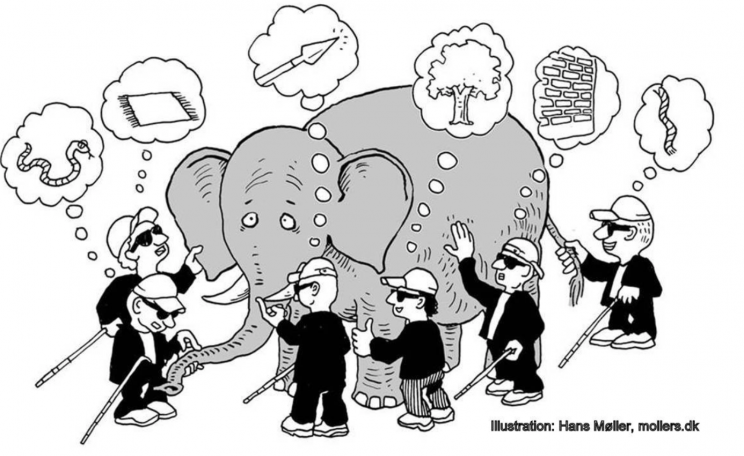Can you imagine how inspiring and heart-mind-blowing spending many months in deep conversation in such a learning community can be?
I will sing of well-founded Gaia, mother of all, eldest of all beings. / She feeds all creatures that are in the world, / All that go upon the goodly land, / And all that are in the paths of the seas, / And all that fly: all these are fed of her store. – Hesiod, Greek poet, 7th century BCE
The first time I heard these lines was in the autumn of 2001 in a class with Stephan Harding, who was teaching us Gaia theory as part of the Masters in Holistic Science course at Schumacher College. And of course, it didn’t take long – simply being in Stephan’s effervescent presence – to get “Gaia-ed”.
This article first appeared in the Resurgence & Ecologist magazine.
It was infectious to experience this somewhat shy and soft spoken, Oxford-educated academic suddenly transform into Gaia’s singing bard and a magical storyteller. Cuatro in hand, Stephan, a zoologist and ecologist, re-enchanted an animate Earth with the cutting-edge Earth systems science that now forms the basis of most climate models.
Students
Stephan’s experience as a field ecologist communing with muntjac deer in Oxfordshire, or roaming the verdant, symphonic forests of Costa Rica, combined with his friendship with James Lovelock, Arne Naess and David Abram, along with his passion for C.G. Jung, created a unique blend of science, deeply embodied love and fascination for the dynamic dance of life’s regenerative impulse, and an exemplary commitment to giving voice to Gaia.
He perfected the art of enticing people into a deeply personal, carnal intimacy with a living planet.
Being Gaia-ed by Stephan changed my life. I know Paul Dickinson would say the same. There would be no Carbon Disclosure Project (CDP) had he not been Gaia-ed by Stephan too. There are now many of us out there – thousands around the world!
What I learned during the masters in holistic science course, which was co-curated by Stephan and Brian Goodwin, has formed the basis of my personal and professional work too. Their brilliance and passion reaffirmed a participatory way of knowing and being ofthis world that put me on the path I have now been on for over 20 years. I owe so much to both of them.
The autumn and winter of 2001 was a very eventful time at Schumacher College. Just before the students arrived, Stephan and Julia’s son Oscar was born.
Seasoned
Nine days later the terror attacks of 11 September happened, and just before the Christmas break Brian had an aortic aneurysm in front of us, while we were all dressed in drag to prank him on the last day of classes.
Seven hours of open-heart surgery and a near-death experience followed, only to see Brian’s miraculous recovery to playing volleyball with Fritjof Capra in May of the following year.
Stephan, Brian and the Catalan philosopher Jordi Pigem sat through almost all of the classes with visiting teachers and our group of only nine students.
Can you imagine how inspiring and heart-mind-blowing spending many months in deep conversation in such a learning community can be?
We had constant cross-referencing of the subjects we covered with each of them and benefited also from their questions to our guests.
These included James Lovelock, David Suzuki, Rupert Sheldrake, Margaret Colquhoun, Henri Bortoft, Craig Holdrege, Arthur Zajonc, Patricia Shaw, Peter Reason, Françoise Wemelsfelder, David Orr, John and Nancy Todd, Helena Norberg-Hodge, Amory Lovins, and many others. These names need no further introduction to seasoned readers of the Resurgence and Ecologist magazine.
Sensing
Can you imagine how inspiring and heart-mind-blowing spending many months in deep conversation in such a learning community can be? My life would be poorer without those embodied memories of a Deep Time Walk with Stephan along the Devon coastline to Dartmouth, or being up on Dartmoor, in the wind and the rain, listening to Stephan animating – almost dancing – Gaian cycles.
His craft as a storyteller had the power of Thích Nhất Hạnh’s writing on interbeing as he brought into relationship the rain, the chemicals washed out of the granite, the river Dart, the phytoplankton in the oceans incorporating these chemicals, and the gases exhaled by these algae rising into the atmosphere to form the condensation particles around which clouds form, which carry the moisture for more rain on Dartmoor – the magnificence of interbeing!

I am also deeply grateful for Stephan’s suggestion, after reading the first draft of my masters thesis on ‘Exploring Participation’, to save the bulk of it for my PhD, as I had overshot by a mere 300 pages. This allowed me later to win a scholarship at the University of Dundee for a funded doctorate on ‘Design for Human and Planetary Health: A Holistic/Integral Approach to Complexity and Sustainability’, which I completed in 2006.
It was Stephan who introduced me to C.G. Jung’s ‘four ways of knowing’: sensing, feeling, intuiting and thinking. The fourth tends to dominate, as our education system prioritises it to the point of dismissing the other three as – supposedly – non-scientific.
Phoenix
Stephan had a brilliant mind and was as overeducated as the best of us, yet he modelled to us students how it was a daily practice to recover our atrophied capacity to let sensing, feeling and intuiting be our pathways into a relational being within a living world.
Stephan’s integrity and humility on his own path of becoming a vehicle through which life’s regenerative impulse can act gave him the ability to not simply speak about Gaia, but speak as Gaia.
During our evening conversations in the Edge of Chaos – the college bar – among the students we sometimes mused that neither Marsilio Ficino nor Giovanni Pico della Mirandola, during their meetings at The Academy in 15th century Florence, had any idea that they were living the birth of the Renaissance. Nor did they know it would lead to a scientific revolution.
If humanity makes it through the eye of the needle ahead, the Gaian cultures that will come after us may well remember Stephan Harding and Schumacher College.
Stephan’s contribution lives on through thousands, and Schumacher College will re-emerge like a phoenix from the ashes of the current crisis. Thank you for singing of Gaia, dear Stephan!
This Author
Daniel Christian Wahl is the author of Designing Regenerative Cultures and was a student of Stephan’s on the Schumacher College Holistic Science MSc (2001–2). Schumacher College is currently closed to students. This article first appeared in the Resurgence & Ecologist magazine.






